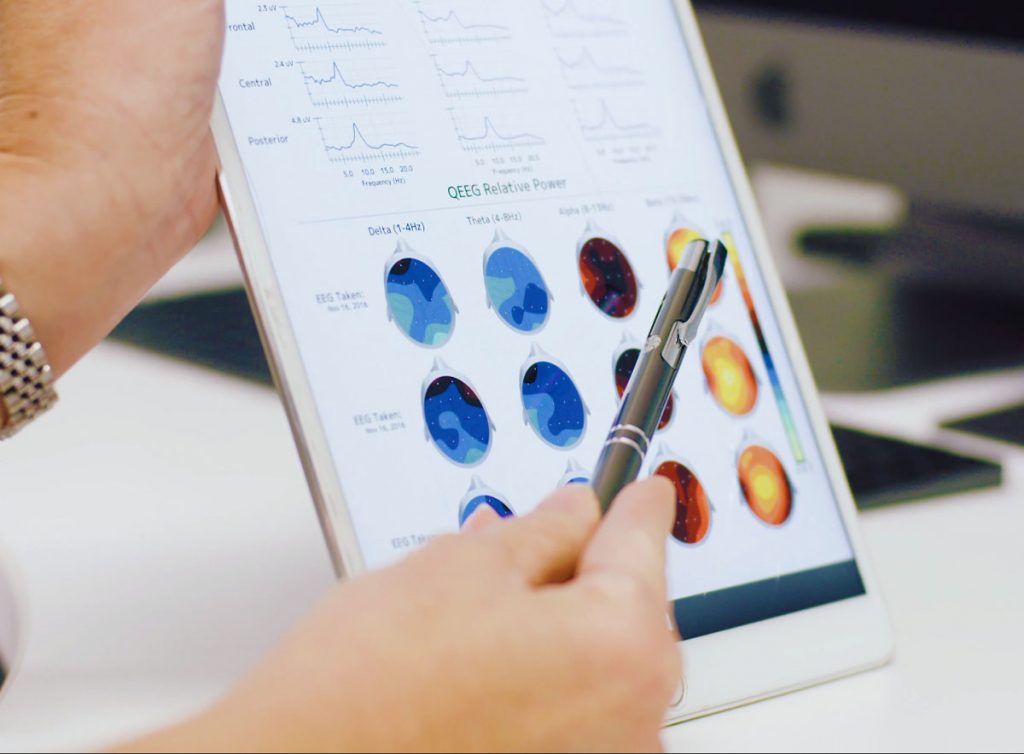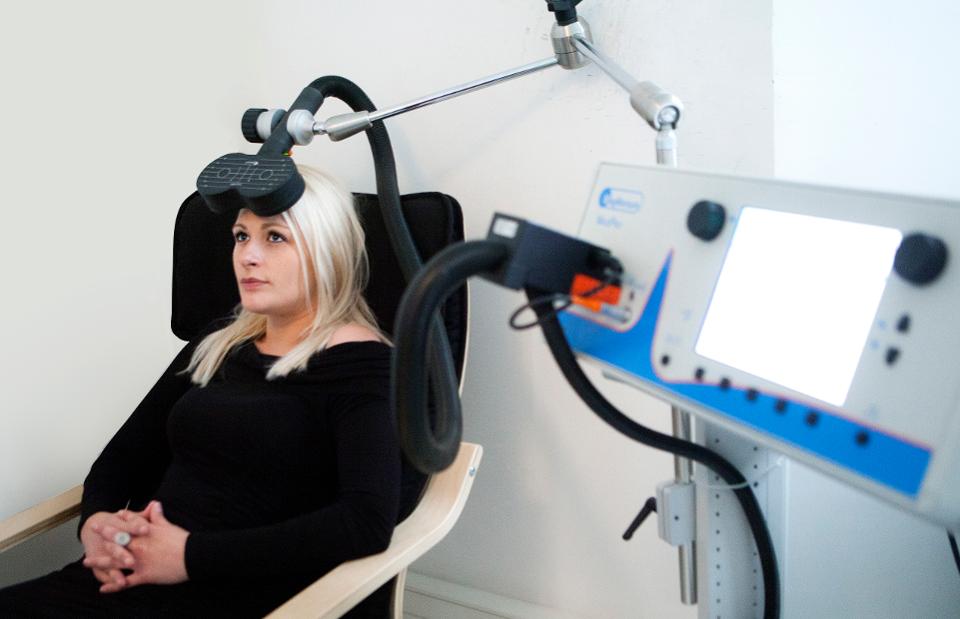
MeRT: A New, Non-Invasive, Drug-Free Treatment for Cognitive Decline
By improving brain function, MeRT treatment can:
- Slow the progression of cognitive decline
- Improve memory and focus
- Enhance problem-solving and decision-making skills
- Increase mental clarity and cognitive performance

Talk with Our New Patient Coordinator
She can answer your questions, explain the procedures, and review all details. Or fill in the form at the bottom of this page, and she will contact you.
Cognitive Decline Treatment with MeRT Can Make You Feel Like Yourself Again
Experiencing cognitive decline can make you feel frustrated, afraid, and even angry. Memory issues, burnout, and decision-making problems can be unsettling — to say the least.
Declining cognitive ability can dramatically affect your daily life, work, and relationships.
The aging process, chronic stress, and other health factors can all contribute to a decline in brain function. However, you don’t have to just “live with it.”
At the Brain Treatment Centers of Columbus and Cincinnati, we offer a solution: MeRT, or Magnetic e-Resonance Therapy. MeRT is a non-invasive, drug-free treatment that works to balance your brainwave activity.
By improving brain function, MeRT has helped many people improve their cognitive performance — and feel like themselves again.
I’ve made significant progress in cognitive ability, stress tolerance, and mental clarity. I have been able to handle decisions much better and think more clearly. And I have been able to significantly decrease conflict with my family and actually lead much better.”
– executive after Mert treatment for cognitive decline
Stages of Cognitive Decline
Cognitive decline is the slow deterioration of cognitive functions, including memory, reasoning, and problem-solving. While the stages of cognitive decline can vary depending on the underlying cause, there are recognized stages associated with conditions like Alzheimer’s disease. These are:
- Normal Aging: Minor cognitive changes due to aging, with minimal impact on daily life.
- Mild Cognitive Impairment (MCI): Intermediate stage with noticeable cognitive changes, but not meeting dementia criteria. Memory problems and mild impairments are common.
- Early-Stage Dementia: Pronounced cognitive deficits, including memory loss, language difficulties, and altered behavior, though individuals can often perform basic daily tasks independently.
- Middle Stage Dementia: More severe cognitive decline with worsening memory problems and increased dependency on others for daily tasks. Behavioral symptoms may emerge.
- Late-Stage Dementia: The most advanced stage, marked by severe memory impairment, communication difficulties, and complete dependence on others for care. Individuals may become bedridden.

The progression and severity of cognitive decline can vary depending on the underlying cause and individual factors. Early diagnosis and care are crucial for managing these conditions. Even if cognitive decline has progressed, effective treatments like MeRT offer hope for symptom reduction.

Cognitive Decline Symptoms
Common symptoms of cognitive decline include:
- Frequent forgetfulness and memory loss
- Trouble focusing and maintaining attention
- Missing appointments and social commitments
- Decision-making challenges
- Difficulty understanding instructions
- Navigation problems
- Increased impulsivity
- Poor judgment
- Speech and communication issues
- Getting lost or wandering
- Repetitive questions and word-finding difficulties
- Loss of interest in social interactions
- Reduced empathy
- Paranoia, delusions, or hallucinations
- Balance problems
Recognizing these symptoms is vital for early intervention and effective treatment.
MeRT: A Breakthrough Approach to Treating Cognitive Decline
The MeRT process to improve cognitive function includes:
- qEEG (quantitative electroencephalogram) brain mapping to gain valuable insights into your unique brainwave patterns. The EEG results will show any imbalance in brainwave function.
- A personalized treatment plan using TMS (transcranial magnetic stimulation) to restore brainwave communication and function.
The qEEG is the key to MeRT’s results. By knowing your precise brainwave imbalance, we can then tailor your TMS treatment to those specific areas of the brain to improve brain connectivity and communication.
The equipment used in MeRT is FDA-cleared to treat Major Depressive Disorder and OCD and is used off-label to treat a wide variety of conditions, including Cognitive Decline.

MeRT Treatment for Cognitive Decline at the Brain Treatment Centers of Columbus and Cincinnati: What to Expect
Before deciding if MeRT is the right treatment for you, call us for a free consultation with our New Patient Coordinator. This is a no-obligation call, where she will discuss your symptoms and history, answer your questions, and explain the treatment in full. This includes all fees and protocols.
Then, once you decide to take the next step, we will set up an appointment for initial testing. This appointment will last 45 minutes to an hour. After that, we will analyze the results and schedule you for a consultation.



Talk with Our New Patient Coordinator
She can answer your questions, explain the procedures, and review all details. Or fill in the form at the bottom of this page, and she will contact you.
The MeRT treatment protocol comprises three steps: Testing, Consultation, and Treatment. Following are the specifics of each step:
1. Testing
At your first appointment, we will perform two simple tests: a qEEG and an EKG. These tests are painless, and we perform them right here in our office.
For the EEG, we place a cap on your head to measure the electrical activity in your brain and map out any areas not performing as they should. We also perform an EKG to record your heart’s electrical signals.
Once we perform these tests, our team will carefully analyze the results. Based on this analysis, we develop a treatment plan customized to your specific condition.
2. Consultation
After your tests are complete and we’ve reviewed and analyzed them, you will have a one-on-one consultation with Dr. Mehra Tarun or Nurse Practitioner Linna Morgan. You can either do this consultation in person or virtually from the comfort of your home.
During this consultation, we will discuss your test results and treatment plan. We will also answer any remaining questions you may have and let you know more about what to expect during your treatment period.
3. Treatment Period
During the treatment period, we will perform two weeks of TMS treatment at a time. After each two-week period, we will perform a new set of tests (EEG and EKG) to see how you are responding.
Please note that we highly recommend a minimum of four weeks of treatment to determine if you are responding positively to treatment, both clinically and on the repeat qEEG. If you are experiencing improvements, we recommend an additional two to four weeks of treatment for long-lasting results.
We monitor your progress based on the new EEG results as well as symptom improvements. You will also have a consultation to confirm that changes are still showing in the testing.
Most conditions treated with MeRT provide noticeable and long-lasting results after six weeks of treatment. However, each patient is different, and the results may vary.
Insurance
Unfortunately, we do not accept insurance nor file it on your behalf.
Currently, MeRT is FDA-cleared for Major Depressive Disorder and Obsessive-Compulsive Disorder (OCD). For conditions other than Major Depressive Disorder and OCD, insurance rarely reimburses any of the costs associated with treatment.
Questions? Need more information? Call our New Patient Coordinator.
We know how difficult it can be to decide on a new treatment, particularly if past treatments haven’t gotten the results you’d hoped for. You may still have a lot of questions about whether MeRT is the right treatment for you.
We want to make sure you get all the information you need to make the best possible decision, and that begins with a call to our New Patient Coordinator.
The New Patient Coordinator is here to help you. She’ll take the time to listen, answer questions, explain costs, and put your mind at ease. Additionally, she can help you get scheduled if you decide that, yes, MeRT is the right treatment for you.
When you think about it, making this one free, no-obligation call just might be the first step in starting to feel like yourself again!

Contact our New Patient Coordinator.
Or fill out the form below and she will contact you.
Contact Us
For more information or to speak with our New Patient Coordinator, please fill in the information below.